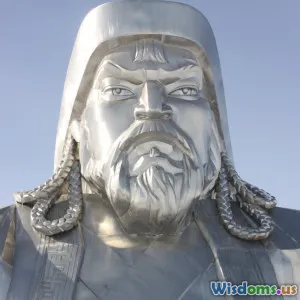
Game Changers Across Eras
7 min read Explore visionary figures whose bold ideas revolutionized history, shaping societies and inspiring generations. (0 Reviews)
Game Changers Across Eras: Icons Who Transformed History
Throughout human history, a handful of visionary individuals have dramatically altered the course of civilization. These game changers—innovators, leaders, and thinkers—ushered in new paradigms that transformed technology, politics, culture, and society. By examining their stories, we gain insight into how bold ideas and courageous actions fuel progress and offer inspiration for future impact.
Introduction: Defining the Power of a Game Changer
What does it take to be a true "game changer"? It requires daring to challenge the status quo, coupled with a vision that extends beyond conventional limits. From inventing groundbreaking technologies to pioneering social revolutions, these figures didn't merely influence their times—they irrevocably altered the human journey. This article explores landmark individuals across different eras:
- Ancient innovators who laid the foundation for civilization
- Enlightenment thinkers who reimagined societies
- Modern pioneers in technology and social justice
Through detailed examples and historical insights, we will unravel how their contributions continue to resonate.
Ancient Revolutionaries: Foundations of Civilization
Imhotep: The Architect of Innovation
Around 2600 BCE, Imhotep, an Egyptian polymath, emerged as perhaps history’s earliest recorded engineer and physician. Credited with designing the Step Pyramid of Djoser—the world's first colossal stone structure—Imhotep revolutionized architecture by moving from mud-brick to stone constructions. He also advanced medical knowledge documented in papyri centuries ahead of Hippocrates.
His integration of art, mathematics, and medicine symbolized an early game-changing mindset: interdisciplinary thinking.
Confucius: Architect of Ethical Governance
In 6th century BCE China, Confucius established a philosophical framework emphasizing morality, social harmony, and justified leadership. His teachings shaped East Asian societies and governance structures for over two millennia.
His insistence on virtue and education as pillars of societal progress created a cultural legacy resistant to upheaval—a game changer that empowered generations.
Renaissance and Enlightenment: Birth of Modern Thought
Leonardo da Vinci: The Quintessential Polymath
Leonardo (1452–1519) epitomized the Renaissance man, bridging art and science with inventions far ahead of his time—from flying machines to anatomical studies. Though many designs remained unbuilt, his notebooks influenced future engineering and fostered a new appreciation for empirical observation.
His capacity to blend creativity with scientific inquiry marked a paradigm shift away from medieval dogmas.
Mary Wollstonecraft: Pioneer of Women’s Rights
In 1792, Wollstonecraft challenged prevailing notions about women's intellectual inferiority in her book A Vindication of the Rights of Woman. Advocating education equality, she laid foundational principles for feminist movements centuries later.
Her radical ideas about gender and empowerment shattered entrenched societal norms, ushering in a new era of social justice.
Modern Game Changers: Shaping the Contemporary World
Nikola Tesla: The Visionary of Electricity
Tesla’s work in the late 19th and early 20th centuries on alternating current (AC) systems revolutionized electrical engineering. His inventions enabled long-distance power transmission, forming the backbone of modern electricity grids.
Despite being overshadowed in his lifetime by competitors like Edison, Tesla’s contributions fostered a global energy revolution still powering the world today.
Rosa Parks: Catalyst of Civil Rights Movement
In 1955, by refusing to give up her bus seat, Rosa Parks triggered a profound shift in the American civil rights tide. Her courageous act inspired the Montgomery Bus Boycott, mobilizing widespread activism against racial segregation.
Parks’ singular moment exemplifies how individual courage can catalyze systemic change.
Steve Jobs: Revolutionizing Technology and Culture
As co-founder of Apple Inc., Steve Jobs reshaped personal computing, music, and telecommunications. Innovations like the iPhone redefined user experience and established new industry standards.
Jobs’ relentless pursuit of elegant design combined with technology driven accessibility made complex technologies consumable and desirable worldwide.
What Makes a Game Changer?
Several common traits emerge across these diverse figures:
- Vision: Seeing beyond existing limitations
- Resilience: Overcoming opposition and failure
- Impact: Creating lasting, scalable change
- Interdisciplinary Approach: Harnessing knowledge across fields
As management expert Peter Drucker famously said, “The best way to predict the future is to create it.” Game changers embody this by boldly envisioning and crafting futures others cannot yet see.
Conclusion: Inspiration for Today’s Innovators
Looking back at historical game changers illuminates a vital truth—progress hinges on individuals willing to defy convention and pioneer new paths. From the architects of ancient pyramids to digital visionary entrepreneurs, their legacies remind us that transformational change is possible through courage, creativity, and perseverance.
In our rapidly evolving world, anyone equipped with passion and purpose can become the next game changer. By studying history’s trailblazers, we gain not only inspiration but actionable insight to influence our own futures.
Begin by nurturing curiosity, embracing diverse perspectives, and committing to lifelong learning—these are the stepping stones to forging breakthroughs that resonate across generations.
Together, armed with these timeless lessons, we can shape history’s next remarkable chapter.
“Innovation distinguishes between a leader and a follower.” — Steve Jobs
Rate the Post
User Reviews
Popular Posts




















